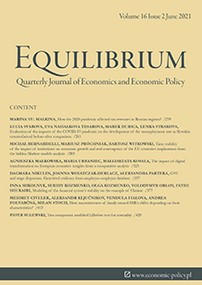Temporary contracts and Okun’s law in Poland
Temporary contracts and Okun’s law in Poland
Author(s): Krzysztof BartosikSubject(s): Labor relations, Economic development, Human Resources in Economy, Socio-Economic Research, Labour and Social Security Law
Published by: Instytut Badań Gospodarczych
Keywords: Okun’s law; temporary contracts; labor market; economic growth;
Summary/Abstract: Research background: The share of temporary workers in Poland is one of the largest of any EU country, which may affect the output unemployment relationship. The Polish case seems to be a natural experiment. Contrary to many advanced European countries, the spread of temporary contracts in Poland was not caused by labor market reform but instead resulted mainly from spontaneous processes. Purpose of the article: This paper investigates the effect of the widespread use of temporary contracts on the relationship between output and unemployment in Poland. Methods: The analysis is based on the ‘dynamic’ version of Okun’s law and uses OLS regression, OLS split-sample regression and OLS rolling regression. The sample period is 1996–2018. Findings & Value added: The study found that unemployment’s sensitivity to output increased over time and was related to the greater use of temporary contracts, particularly among young people and women. Initially, at the turn of the 21st century, the expansion of temporary jobs changed the employment composition and had an insignificant effect on unemployment since firms mainly replaced permanent contracts with temporary contracts. Then, starting around 2006, temporary contracts began affecting unemployment levels and unemployment’s responsiveness to output. During this period, firms used temporary contracts as the main workforce adjustment device during the business cycle.
Journal: Equilibrium. Quarterly Journal of Economics and Economic Policy
- Issue Year: 15/2020
- Issue No: 4
- Page Range: 735-760
- Page Count: 26
- Language: English

